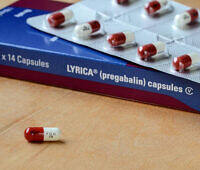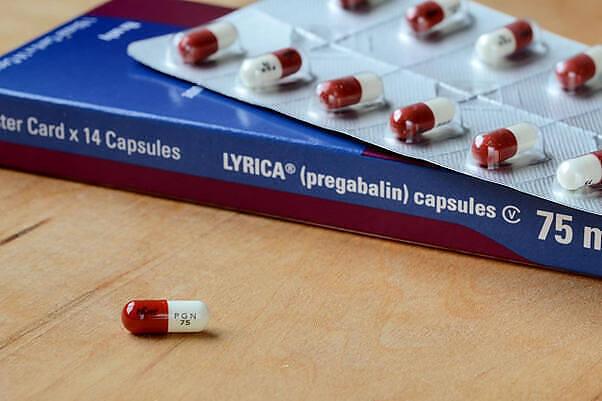
Pregabalin and Alcohol
Mixing Pregabalin and Alcohol
In this article, we look at the effects and risks of mixing pregabalin and alcohol. We also look at the dangers of dual dependence and how this can form.
Pregabalin is a commonly prescribed gabapentinoid, sold under the brand name of Lyrica, that has many on-label and off-label uses. Pregabalin can be prescribed short-term for anxiety-related conditions or long-term for neuropathic pain conditions and to control epilepsy.
Similar to Gabapentin, Pregabalin is often better tolerated with fewer side effects. However, as Pregabalin is a central nervous system depressant, it tends to cause drowsiness. Drinking alcohol or taking other CNS depressants with Pregabalin can increase the effects of both substances, sometimes to a great degree, depending on a person’s tolerance and the amounts taken.
Pregabalin and alcohol can each create physical tolerance and dependence and can have dangerous, even life-threatening withdrawal symptoms. If you or a loved one have a problem with these substances, read on to learn more and find out what to do if you need help.
What is Pregabalin?
Pregabalin is a gabapentinoid, which is different from opioid painkillers, and it is not a narcotic drug. However, due to its abuse potential and addictiveness, Lyrica is classified as a Class C controlled drug in the UK and a Schedule V drug in the US.
Whilst there is limited research on Lyrica addiction, it is possible to develop a physical dependence and psychological attachment to the drug. This is due to pregabalin producing feelings of euphoria in some patients. Others may become reliant on it for its anti-anxiety effects.
It is important to note here that while pregabalin can effectively reduce pain and anxiety, it is not a cure. Symptoms will return on stopping the medication unless the underlying issue is resolved. Additionally, this medication can become less effective the longer it is taken.
Over time and with repeated use, Pregabalin will often lose its effectiveness in managing a person’s symptoms. This is known as tolerance. When this occurs, the dosage will need to be increased.
Whilst medications such as Lyrica do not cause as many deaths as opioids, abuse of such drugs does happen. Pregabalin-related deaths are primarily caused by overdose, usually unintentionally. It has also been found that for those aged 15 to 25 who take gabapentinoids, there is a 26% increase in suicidal behaviour, a 24% increase in accidental overdose, a 22% increase in head or body injuries, and a 13% increase for car crashes and traffic offences.
Pregabalin and Alcohol Withdrawal
Pregabalin withdrawal can occur even with regular doses and with short-term use, the effects of which can be dangerous. Alcohol withdrawal is notoriously risky and unpredictable and can result in seizures and even death.
Where there is a dual dependence on alcohol and pregabalin, a clinical medical detox is the safest option. Both of these substances are central nervous system depressants, and attempting an unmanaged withdrawal from both will send the brain and body into acute overdrive. This can result in tremors, hallucinations, insomnia and seizures, amongst other unpleasant and high-risk withdrawal symptoms.
Pregabalin and alcohol both have similar withdrawal effects, so withdrawing from both at the same time will be, at best, extremely unpleasant and, at worst, life-threatening.
How Drug And Alcohol Dependence Happens
To properly understand the process of drug and alcohol withdrawal, it is helpful to know how dependence develops in the first place.
When the brain is frequently exposed to drugs or alcohol so that it can continue to function, certain neurotransmitters begin to change. These changes in the brain allow the brain to perform typically under the presence of substances. These chemical changes are long-lasting and contribute to alcohol and drug dependence.
The brain adapts to continue functioning when it is excessively exposed. A person with a drug or alcohol dependence will always need a certain level of the substance in their system. If this level falls below what the brain has adapted to function with, withdrawal symptoms develop. The brain cannot automatically calibrate. This is a process that takes time. Just as dependence doesn’t form overnight, the brain needs time to adjust.
Whilst we use the term drugs or substances, sadly, many people discount prescribed medications from this. The reason is that they are given out by qualified medical professionals whom we trust. Surely a doctor wouldn’t prescribe something that can negatively impact our health?
Sadly, many doctors (not all) still only prescribe to treat symptoms, especially when it comes to mental health problems. The focus on dealing with the underlying causes of a mental health problem tends to come after prescribing various drugs has failed to work.
Many people who have a dependence on pregabalin have been prescribed this medication for months and even years. Pregabalin was once hailed to be a safer alternative to valium, and maybe it is, but the difference is marginal.
Today, gabapentinoids are widely available online and on the streets. There are many fake versions of pregabalin and gabapentin available off prescription.
Signs of Pregabalin and Alcohol Withdrawal

If you frequently mix alcohol and pregabalin (Lyrica) together, you may develop a dual dependence on both substances. Being dependent on just one of these substances is challenging enough to overcome, but when a dual dependence occurs, withdrawal can be difficult, protracted and exceptionally dangerous.
Both pregabalin and alcohol produce physical and psychological withdrawal symptoms that are very similar to each other. These withdrawal symptoms can start shortly after you miss a regular dose.
The intensity of pregabalin and alcohol withdrawal symptoms can vary from person to person, but a timeline can be roughly established based on the following:
- How long have you been dependent on pregabalin or alcohol
- Whether you are dually addicted to both
- Any other drugs or medications that you frequently take
- The quantities and dosages of the substances you are dependent on
- Your general physical and mental health
- Your age. Age can play a factor, especially in elderly patients who are more prone to suffering from severe withdrawals.
- The method of detoxification you choose
- The quality of support you have around you
If you or a loved one have a dependence on alcohol or pregabalin, you should not stop either abruptly. Cold turkey detoxes from central nervous system depressants, such as pregabalin or alcohol, can result in life-threatening symptoms.
Call one of our friendly addiction experts for help. We will conduct a free and confidential assessment to determine the best course of treatment for your individual needs, location, and budget.
Can I Drink Pregabalin with Alcohol?
Drowsiness is a common side effect when first taking pregabalin (Lyrica). Drinking alcohol when your body is acclimatising to pregabalin, during the first few weeks of taking it, or during a dosage increase can cause significant sleepiness.
This can put you at risk of an accident and slow your normal breathing rate. Side effects such as confusion, nausea and dizziness will also be increased if you drink alcohol whilst taking pregabalin. It is, therefore, advised to avoid alcoholic beverages when first starting this medicine and during a dosage increase.
Even once you have adjusted to taking pregabalin, alcohol consumption is still risky and increases the risk of negative consequences.
The Effects of Mixing Pregabalin And Alcohol Include:
- Impaired judgement and decision-making skills
- Sleepiness
- Impaired coordination
- Difficulty breathing
- Sedation and drowsiness
There is evidence that Pregabalin, when taken with certain other CNS depressants or if you have a breathing problem, can be dangerous and even deadly.
Breathing issues are more likely to occur if you have an underlying breathing condition or if you mix pregabalin with other CNS depressants such as alcohol, sleeping tablets or opioids.
If you notice your breathing is impaired or you are excessively sleepy while taking pregabalin, you should immediately discuss this with your prescriber. They may lower the dose of the medicine or stop giving it to you altogether.
If you have taken alcohol or opioids with Pregabalin, even in small amounts, you should not drive or operate heavy machinery.
What Not To Take With Lyrica (Pregabalin)
Pregabalin is a strong Central Nervous System depressant medication that slows down your brain and body. Mixing Lyrica with any substance that affects the central nervous system can have unpredictable effects.
If you mix Pregabalin with a stimulant drug such as amphetamines or cocaine, the effects of Pregabalin can be counteracted. This can lead you to take more of the medication than you normally would, putting you at risk of overdose.
Similarly, the risks from combining two or more CNS depressants, such as pregabalin and alcohol, also include overdose, respiratory depression/failure and death.
Opioids and Pregabalin (Lyrica)
Most people who overdose do so unintentionally and as a result of mixing substances. This is demonstrated in Scotland, which has one of the highest death by drugs rates in the world.
In 2021, Scotland recorded 1,330 drug misuse deaths. Of these deaths, 93% showed that more than one drug was present. Pregabalin and Gabapentin are cited as drugs of concern, along with benzodiazepines and opioids.
Alcohol and Pregabalin (Lyrica)
Drinking alcohol is strongly discouraged when first starting pregabalin and during an increase in dosage. This is due to a period of adjustment needed before your brain can function normally. When first taking pregabalin or increasing a dosage, it is normal to feel sleepier than usual.
You may also experience excessive daytime drowsiness, dizziness, clumsiness, and difficulty concentrating (brain fog). These Pregabalin side effects will only be increased by adding alcohol and could put you at risk of unintentional overdose.
Can I Drink Alcohol Once I’m Used To Pregabalin?
Whilst the National Institute for Health and Care Excellence suggests low to moderate alcohol consumption is safe if it does not cause drowsiness or impair your judgment, we would still urge you to exercise extreme caution. Even if you feel relatively alert mixing pregabalin (Lyrica) and alcohol, the combination of both could still lower your blood pressure and slow down your breathing. To remain safe, it is better not to drink any alcohol whilst taking this medication.
Using Pregabalin For Alcohol Withdrawal
If you find yourself dependent on alcohol and unable to stop drinking, you may be tempted to use another drug or medication to help soothe withdrawal symptoms. This is often a very big mistake.
Using drugs such as pregabalin or benzodiazepines to cope with alcohol withdrawal symptoms puts you at a very high risk of relapse. Pregabalin is not a drug that is used in clinical settings for the management of alcohol withdrawal. This is due to mixed results during studies and the fact that there are other more suitable and safer drugs available.
Alcohol detoxification should always be conducted in a clinical setting, such as an alcohol detox clinic or rehab facility. This will ensure that you receive the medical care that you need. Not only that, but you will also receive targeted treatment to help prevent alcohol relapse and treat the underlying causes that have contributed to high-risk alcohol drinking.
If you attempt to use pregabalin at home to wean yourself off alcohol, you will be at high risk of relapse, overdose and dual dependence. This is not something you should ever attempt or even consider.
Risks of Dual Dependence on Pregabalin and Alcohol
It is not uncommon for those who suffer from substance use disorders to have a dependence on more than one substance. This is particularly true for those who mix addictive medicines with alcohol or drugs.
Pregabalin is well known for making users feel a ‘drunkenness’ similar to the effects produced by alcohol. Combing Lyrica and alcohol will not only increase the feelings of being drunk but also increase dangerous side effects such as confusion, poor judgement, lack of coordination, sleepiness, dizziness…the list goes on.
The biggest risk that goes hand in hand with most drug dependencies is overdose, and this is certainly a high-risk factor when both alcohol and pregabalin are abused together.
Detoxing from both substances presents many potential complications, and this is never something that should be attempted without the correct medical guidance and care. Stopping either can be dangerous, but the risks increase when they present a dual dependence.
Alcohol Withdrawal Symptoms Include:
- Anxiety
- Depression
- Confusion
- Nausea and vomiting
- Insomnia
- Increased sweating
- Restlessness
- Muscle aches, pains and weakness
- Delerium Tremens
- Seizures
- Strong alcohol cravings
Pregabalin withdrawal symptoms include:
- Anxiety
- Depression
- Diarrhoea and Nausea
- Insomnia
- Increased sweating
- Flu-like symptoms
- Nervousness
- Seizures
- Strong drug cravings
As you can see from the above, the withdrawal symptoms from pregabalin and alcohol are similar. Withdrawing from both substances at the same time will increase the severity of the symptoms you experience and put you at increased risk of death.
Additionally, an unmanaged detox from these substances will likely result in PAWS. This is a condition whereby withdrawal symptoms are protracted and can come and go for months and months.
We Are Ready To Help
If you or a loved one have a problem with either Pregabalin, alcohol, or both, we can help with rehab.
Detox Plus UK are a leading authority on drug and alcohol detox for the UK and has many treatment options overseas.
Our experts in substance use disorders and detoxification are ready to take your call and listen to your story. We have access to numerous CQC-registered drug and alcohol clinics throughout the UK.
We have rigorously assessed our clinics to ensure they meet the highest standards of care and treatment.
We match treatment programmes, budgets, and locations to your needs, not the other way around. If you need help taking that first vital step, we will support you above and beyond to ensure you get the best treatment and aftercare available.
References
- Associations between gabapentinoids and suicidal behaviour, unintentional overdoses, injuries, road traffic incidents, and violent crime: a population-based cohort study in Sweden
- Pregabalin, known as ‘new valium’, to be made class C drug after deaths
- Pregabalin prescribing information
- National Mission on Drug Deaths: Plan 2022-2026
- Pregabalin
- Pregabalin for alcohol dependence: a critical review of the literature


